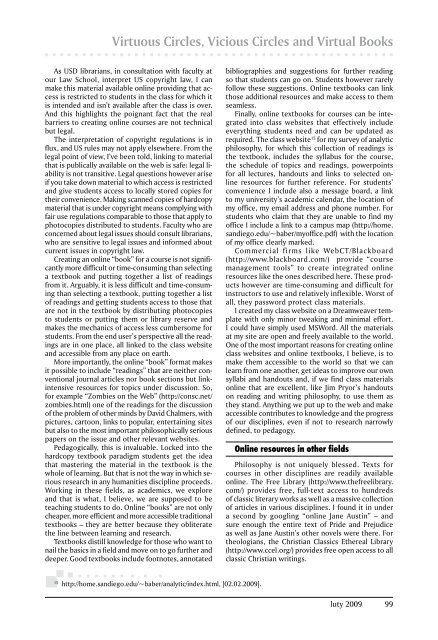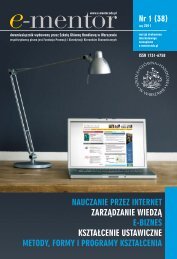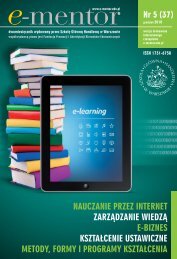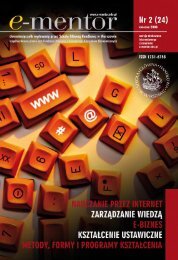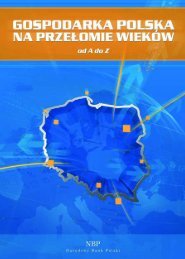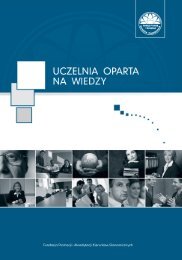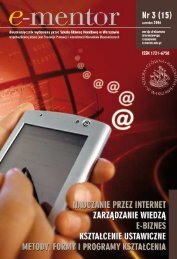e-<strong>edukacja</strong> na świecie“Analytic Philosophy” 8 is the “book” for my surveyof analytic philosophy course. From the student’sperspective it is an integrated package: links to all thereadings are on one web page, organized by topic.Students do not have to search for the readings, eithervirtually or corporeally.Behind the scenes the readings are in differentformats and reside in a variety of places. So, for exampleone of the preliminary readings, “Guidelines onWriting a Philosophy Paper”, is from a website createdand maintained by Jim Pryor, a philosopher at NYU, forhis classes. Pryor notes that in writing this piece hasbenefitted from other writing guidelines on the web.All of us who teach produce syllabi, study guides andthe like for our classes. When this material is availableon the web we can learn from one another in orderto improve our own materials or use materials othershave produced.Pryor has licensed his paper for distributionunder a Creative Commons agreement 9 specifyingthat it may be shared for non-commercial purposes.Creative Commons (http://creativecommons.org/) isa non-profit corporation that provides free legal toolsfor marking creative work with whatever freedomstheir creators want them to carry. The license Pryorhas chosen prohibits users who share his work fromaltering it but allows them to link it to class websiteslike mine and use it for non-commercial educationalpurposes.Most of the readings on the list however are articlesthat appeared in journals from the turn of the 20thcentury to the present. Some, like Bertrand Russell’sclassic article, “On Denoting,” are in the public domain10 . Works published before 1923 are in the publicdomain and may be freely used by everyone. Originallypublished in the journal Mind in 1905, Russell’s articlehas been duplicated at a number of sites to whichusers can link, as I did.Most of the articles I used for my class howeverare more recent. Strawson’s response to Russell, “OnReferring” 11 was published in Mind 45 years later.Like many older articles it is available through JSTOR(http://www.jstor.org), an online archive of journalarticles. Access to articles in JSTOR is restricted: if youhit the link to “On Referring” you should get a pagethat resides at the University of San Diego websiteasking for your name and library barcode. However,like the University of San Diego library, most universitylibraries subscribe to JSTOR and provide passwordprotectedaccess to students and faculty.JSTOR maintains a “moving wall” for articles frommost journals, which typically restrict JSTOR accessto articles that are at least 3 to 5 years old. Howeverlike most university libraries, the University of SanDiego library subscribes to a wide range of commercialservices that provide access to more recent journalarticles, including the contents of current periodicals,and provides password-protected online access tostudents and faculty.Virtually all journal articles in my field are availableonline to most university faculty and students in theUS either through JSTOR or other services. A greatmany recent journal articles are available withoutrestriction at their authors’ websites. Journals’ copyrightpolicies vary but many allow authors to put uppublished articles locally and make them accessiblewithout restriction. In addition, there is a growingnumber of consortia, like White Rose Research Online(http://eprints.whiterose.ac.uk/) that maintain openaccess repositories of journal articles.Linking books or book sections is more problematic.Some are available online. Oxford ScholarshipOnline 12 , to which my university library subscribes,provides online access to the full text of 2,557 OxfordUniversity Press books to students and faculty at subscribinginstitutions. Other book sections are availableelsewhere without restriction. So, for example, thelink to “The Elimination of Metaphysics” 13 a chapterof A. J. Ayer’s Language, Truth, and Logic, goes toThe Athenaeum Library of Philosophy 14 . Historicaltexts that are in the public domain are easy to findonline. Jonathan Bennett’s excellent Early ModernPhilosophy (http://www.earlymoderntexts.com/) siteincludes links to full text works by the Rationalists andEmpiricists as well as modern English “translations”of these works by Bennett, a distinguished historianof philosophy.There was just item on my reading list that was notavailable online, viz. the selection from Wittgenstein’sPhilosophical Investigations. To make this materialavailable to students I had my university library scanthe sections I wanted from a hardcopy of the book for“online reserve.” If you hit the link to the Wittgensteainselection you will get an error message saying “the requestedpage is not available because the course pageis currently outside of the acceptable visibility dates”.The issue here is legal, not technical: Wittgenstein’sPhilosophical Investigations is in print and under copyright.Consequently, making this material available tomy students falls under regulations for “fair use”.8http://home.sandiego.edu/~baber/analytic/readings.html, [02.02.2009].9http://creativecommons.org/licenses/by-nc-nd/2.0/, [02.02.2009].10http://www.unc.edu/~unclng/public-d.htm, [02.02.2009].11https://sally.sandiego.edu/validate?url=http%3A%2F%2F0-www.jstor.org.sally.sandiego.edu%3A80%2Fpage%2FtermsConfirm.jsp%3FredirectUri%3D%2Fstable%2Fpdfplus%2F2251176.pdf, [02.02.2009].12https://sally.sandiego.edu/validate?url=http%3A%2F%2F0-www.oxfordscholarship.com.sally.sandiego.edu%3A80%2Foso%2Fpublic%2Findex.html, [02.02.2009].13http://evans-experientialism.freewebspace.com/ayer01.htm, [02.02.2009].14http://evans-experientialism.freewebspace.com/index.htm, [02.02.2009].98 e-<strong>mentor</strong> nr 1 (28)
Virtuous Circles, Vicious Circles and Virtual BooksAs USD librarians, in consultation with faculty atour Law School, interpret US copyright law, I canmake this material available online providing that accessis restricted to students in the class for which itis intended and isn’t available after the class is over.And this highlights the poignant fact that the realbarriers to creating online courses are not technicalbut legal.The interpretation of copyright regulations is influx, and US rules may not apply elsewhere. From thelegal point of view, I’ve been told, linking to materialthat is publically available on the web is safe: legal liabilityis not transitive. Legal questions however ariseif you take down material to which access is restrictedand give students access to locally stored copies fortheir convenience. Making scanned copies of hardcopymaterial that is under copyright means complying withfair use regulations comparable to those that apply tophotocopies distributed to students. Faculty who areconcerned about legal issues should consult librarians,who are sensitive to legal issues and informed aboutcurrent issues in copyright law.Creating an online “book” for a course is not significantlymore difficult or time-consuming than selectinga textbook and putting together a list of readingsfrom it. Arguably, it is less difficult and time-consumingthan selecting a textbook, putting together a listof readings and getting students access to those thatare not in the textbook by distributing photocopiesto students or putting them or library reserve andmakes the mechanics of access less cumbersome forstudents. From the end user’s perspective all the readingsare in one place, all linked to the class websiteand accessible from any place on earth.More importantly, the online “book” format makesit possible to include “readings” that are neither conventionaljournal articles nor book sections but linkintensiveresources for topics under discussion. So,for example “Zombies on the Web” (http://consc.net/zombies.html) one of the readings for the discussionof the problem of other minds by David Chalmers, withpictures, cartoon, links to popular, entertaining sitesbut also to the most important philosophically seriouspapers on the issue and other relevant websites.Pedagogically, this is invaluable. Locked into thehardcopy textbook paradigm students get the ideathat mastering the material in the textbook is thewhole of learning. But that is not the way in which seriousresearch in any humanities discipline proceeds.Working in these fields, as academics, we exploreand that is what, I believe, we are supposed to beteaching students to do. Online “books” are not onlycheaper, more efficient and more accessible traditionaltextbooks – they are better because they obliteratethe line between learning and research.Textbooks distill knowledge for those who want tonail the basics in a field and move on to go further anddeeper. Good textbooks include footnotes, annotatedbibliographies and suggestions for further readingso that students can go on. Students however rarelyfollow these suggestions. Online textbooks can linkthose additional resources and make access to themseamless.Finally, online textbooks for courses can be integratedinto class websites that effectively includeeverything students need and can be updated asrequired. The class website 15 for my survey of analyticphilosophy, for which this collection of readings isthe textbook, includes the syllabus for the course,the schedule of topics and readings, powerpointsfor all lectures, handouts and links to selected onlineresources for further reference. For students’convenience I include also a message board, a linkto my university’s academic calendar, the location ofmy office, my email address and phone number. Forstudents who claim that they are unable to find myoffice I include a link to a campus map (http://home.sandiego.edu/~baber/myoffice.pdf) with the locationof my office clearly marked.Commercial firms like WebCT/Blackboard(http://www.blackboard.com/) provide “coursemanagement tools” to create integrated onlineresources like the ones described here. These productshowever are time-consuming and difficult forinstructors to use and relatively inflexible. Worst ofall, they password protect class materials.I created my class website on a Dreamweaver templatewith only minor tweaking and minimal effort.I could have simply used MSWord. All the materialsat my site are open and freely available to the world.One of the most important reasons for creating onlineclass websites and online textbooks, I believe, is tomake them accessible to the world so that we canlearn from one another, get ideas to improve our ownsyllabi and handouts and, if we find class materialsonline that are excellent, like Jim Pryor’s handoutson reading and writing philosophy, to use them asthey stand. Anything we put up to the web and makeaccessible contributes to knowledge and the progressof our disciplines, even if not to research narrowlydefined, to pedagogy.Online resources in other fieldsPhilosophy is not uniquely blessed. Texts forcourses in other disciplines are readily availableonline. The Free Library (http://www.thefreelibrary.com/) provides free, full-text access to hundredsof classic literary works as well as a massive collectionof articles in various disciplines. I found it in undera second by googling “online Jane Austin” – andsure enough the entire text of Pride and Prejudiceas well as Jane Austin’s other novels were there. Fortheologians, the Christian Classics Ethereal Library(http://www.ccel.org/) provides free open access to allclassic Christian writings.15http://home.sandiego.edu/~baber/analytic/index.html, [02.02.2009].luty 2009 99
- Page 2 and 3:
3 Od redakcji3 Aktualnościmetody,
- Page 4 and 5:
metody, formy i programy kształcen
- Page 6 and 7:
metody, formy i programy kształcen
- Page 8 and 9:
metody, formy i programy kształcen
- Page 10 and 11:
metody, formy i programy kształcen
- Page 12 and 13:
metody, formy i programy kształcen
- Page 14 and 15:
metody, formy i programy kształcen
- Page 16 and 17:
metody, formy i programy kształcen
- Page 18 and 19:
metody, formy i programy kształcen
- Page 20 and 21:
metody, formy i programy kształcen
- Page 22 and 23:
metody, formy i programy kształcen
- Page 24 and 25:
e-edukacja w krajuuczniowie powinni
- Page 26 and 27:
e-edukacja w krajuBadania brytyjski
- Page 28 and 29:
e-edukacja w krajuIT literacy), obe
- Page 30 and 31:
e-edukacja w krajuspersonalizowaneg
- Page 32 and 33:
e-edukacja w krajuŚrodowisko tworz
- Page 34 and 35:
e-edukacja w krajuz założonymi ce
- Page 36 and 37:
e-edukacja w krajuniezbędne jest u
- Page 38 and 39:
e-edukacja w krajuPrzykładowa stru
- Page 40 and 41:
e-edukacja w krajuNauczanie język
- Page 42 and 43:
e-edukacja w krajusiedziby odwzorow
- Page 44 and 45:
e-edukacja w krajuMożliwości zast
- Page 46 and 47:
e-edukacja w krajuczy różnymi rod
- Page 48 and 49: e-edukacja w krajuPrzydatność ser
- Page 50 and 51: e-edukacja w krajumających na celu
- Page 52 and 53: e-edukacja w krajuDla dydaktyki w s
- Page 54 and 55: e-edukacja w krajuw sieci, powstaj
- Page 56 and 57: e-edukacja w krajuE-learning w orga
- Page 58 and 59: e-edukacja w kraju(24,3 proc. odpow
- Page 60 and 61: e-edukacja w krajuWykres 6. Ocena p
- Page 62 and 63: zarządzanie wiedząw przedsiębior
- Page 64 and 65: zarządzanie wiedząTabela 4. Mapow
- Page 66 and 67: zarządzanie wiedzącyjnej w zarzą
- Page 68 and 69: zarządzanie wiedząTabela 1. Przyk
- Page 72 and 73: zarządzanie wiedząAnaliza sieci s
- Page 74 and 75: zarządzanie wiedząorganization) k
- Page 76 and 77: zarządzanie wiedząSNA, wsparta od
- Page 78 and 79: kształcenie ustawicznePróbę odpo
- Page 80 and 81: kształcenie ustawicznesię z inter
- Page 82 and 83: e-biznesSpołeczne uwarunkowaniamar
- Page 84 and 85: e-biznesłem rynkowym w swojej nisz
- Page 86 and 87: e-biznesnowała rynek przewozów a
- Page 88 and 89: e-biznesZarządzanie transformacją
- Page 90 and 91: e-biznesKrok 1: definiowanie strate
- Page 92 and 93: e-biznes• dostarczonych i planowa
- Page 94 and 95: e-bizneszarządzania portfelem proj
- Page 96 and 97: e-edukacja na świecieing them from
- Page 100 and 101: e-edukacja na świecieWithout surve
- Page 102: e-edukacja na świecieGetting There


